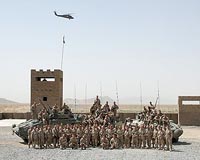| . |  |
. |
Golestan, Afghanistan (AFP) Oct 9, 2009 Bitter tribal rivalries and a Soviet legacy of destruction and plunder in Afghanistan are frustrating foreign forces' plans to develop villages and rid them of Taliban insurgents. A team of seven military development specialists attached to the 2nd Battalion 3rd Marines have been sent to the southwest to win over local elders with the promise of new irrigation systems -- if they reject the militants. But in this impoverished rocky valley, Marines civil affairs chief Staff Sergeant Todd Bowers said winning trust is a slow process because elders have long memories of similar promises from Soviet forces in the 1980s. Locals are also often more interested in defeating rival tribes than securing basic services, he added. "You come out with the intent to do so much and you do so little," said Bowers. "It's the little things on the ground in a counter-insurgency operation that really screw things up and these lessons should have been learned since the Soviets being here. "By the time you start getting to know them it's time to leave, and these places have the most powerful butterfly effect in the world. "If you rough up a kid one day and the Taliban come and ask him to place an IED (improvised bomb) the next, they'll say, 'why not?'" Soviet troops were based in Delaram, 36 kilometres (22 miles) south of Golestan military base, after the 1979 invasion. Evidence of abandoned fighting positions and a half-buried armoured vehicle along the valley between the two districts shows they met a hard-fought resistance from mujahedeen fighters. One military history of the conflict says Soviet troops destroyed villages and roadside orchards, hampering any attempts at befriending the locals. Bowers asks local leaders near the military base to give him a request for development works in writing before he puts together a contract with the help of local workers, which all elders then sign with a thumb print. Most of the works needed here are underground water systems and roads. But in the nearby village of Fayzabad, elder Abdullah Majid said work on a much-needed irrigation project has not begun because of local tribal divisions. "We have some great contractors and I gave them proposals for work," said Bowers. "They agreed to do everything, except they said, 'Fayzabad? We won't work there'. That's Noorzai (tribe) but these guys are Jimalzai." The divisions run so deep that one village will even request a dam intended to flood the farmland of a neighbouring village, he added. As a result, Bowers said his team has tried to identify local needs, rather than those of the elders. The 30-year-old arrived in Afghanistan expecting to simply conduct a thorough census and leave a list of projects for the next group of Marines to complete. But pressure from his bosses meant he was forced to spend the money and initiate development works. "We want to give them things that help the community and that they can build themselves, rather than become reliant on our free handouts," he said. Too often, charities provide wells for villages but local residents feel no sense of ownership and when they break, the villagers simply complain and do not attempt repairs themselves, he added. But the Marines believe that development work has the potential to help win the bloody eight-year war and even reduce reliance on drugs in Afghanistan's south -- if they can overcome local divisions and the Soviet legacy. In the village of Ulah, near Golestan, local census officer Hasim Khan said plans to build a dam across the river and provide wheat seeds for the area could reduce reliance on opium farming. But he warned: "We don't have much time. In the next 50 days we need help and if we don't get it we'll have to grow poppies. We cannot do it ourselves. Our economy is very bad so we need international help."
earlier related report "Canada's military mission in Afghanistan will end in 2011," Harper told reporters. "And we will not be extending the military mission, period." By the time the deadline is reached, "we will have been in Afghanistan longer than we will have been in both world wars combined," added the prime minister. "I think it is time to transform that mission towards development and humanitarian efforts. That's what we're already doing." Some 2,800 Canadian soldiers are currently routing insurgents in volatile Kandahar province in southern Afghanistan as part of the NATO-led International Security Assistance Forces. Canada has lost 131 soldiers to the war since it began its Afghanistan mission in 2002. Harper's comments came a day after a working visit to Ottawa by Afghan Army chief General Bismillah Khan Mohammadi. Share This Article With Planet Earth
Related Links News From Across The Stans
 Tea, nuts and tribal talks in southern Afghanistan
Tea, nuts and tribal talks in southern AfghanistanSpin Boldak, Afghanistan (AFP) Oct 8, 2009 In the dust bowl of southern Afghanistan, near the mountainous border with Pakistan, US soldiers from Spin Boldak forward operating base were preparing for a very important meeting. Four rows of chairs arranged on a carpet in a concrete building had been put out, awaiting the arrival of the 30 or so leaders of rival local tribes invited to discuss their needs. The black, red and green ... read more |
|
| The content herein, unless otherwise known to be public domain, are Copyright 1995-2009 - SpaceDaily. AFP and UPI Wire Stories are copyright Agence France-Presse and United Press International. ESA Portal Reports are copyright European Space Agency. All NASA sourced material is public domain. Additional copyrights may apply in whole or part to other bona fide parties. Advertising does not imply endorsement,agreement or approval of any opinions, statements or information provided by SpaceDaily on any Web page published or hosted by SpaceDaily. Privacy Statement |